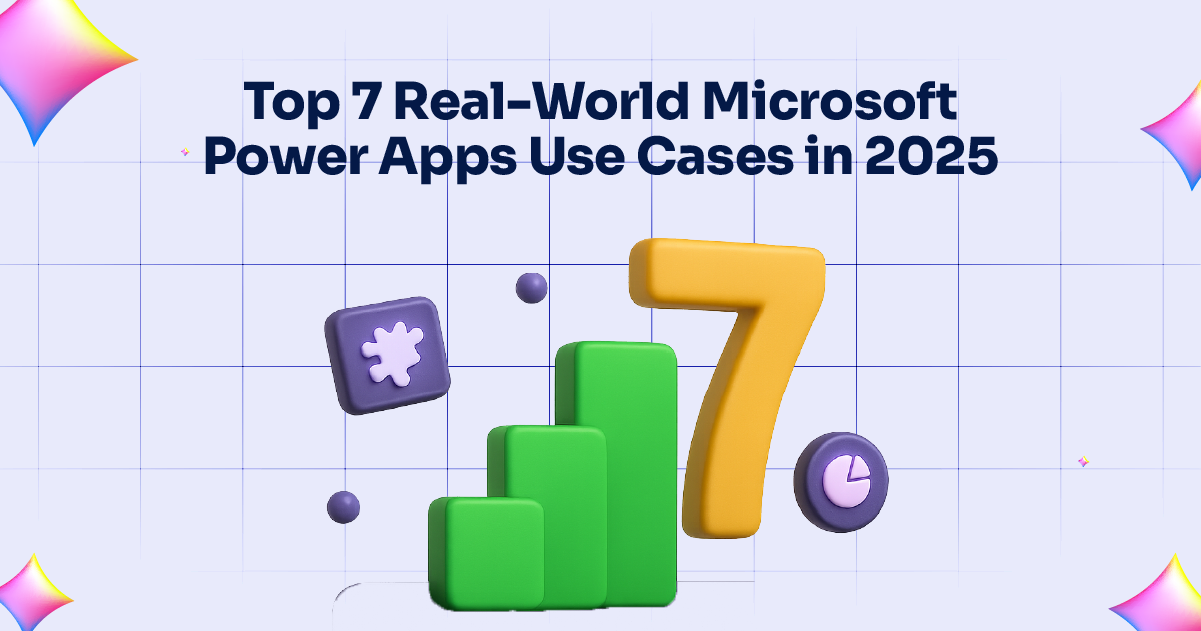
In 2025, Microsoft Power Apps continues to transform how organizations approach app development, providing businesses with the tools to quickly create custom applications without requiring extensive coding expertise. With the growing demand for digital transformation, Power Apps has emerged as a powerful tool that enables companies to streamline operations, enhance collaboration, and improve customer engagement. In this blog, we will explore the top 7 real-world use cases of Microsoft Power Apps in 2025, showcasing how this platform is revolutionizing various industries.
1. Automating Business Processes
One of the primary uses of Microsoft Power Apps is automating business processes. Companies across industries are leveraging the platform to create custom apps that automate repetitive and time-consuming tasks. From approval workflows to data entry automation, Power Apps allows businesses to replace manual processes with automated solutions.
For instance, a manufacturing company can build an app that automates inventory management, tracking stock levels and triggering reorders when necessary. Similarly, HR departments can create apps to automate employee onboarding, leave requests, and performance evaluations, reducing administrative overhead and ensuring consistency.
By automating these business processes, organizations can improve efficiency, reduce human error, and free up valuable resources for more strategic tasks.
2. Customer Relationship Management (CRM)
Another significant application of Microsoft Power Apps is in the realm of Customer Relationship Management (CRM). In 2025, businesses need to build stronger relationships with their customers, and Power Apps makes this easier than ever. With customizable apps, companies can track customer interactions, manage sales pipelines, and gain insights into customer behavior.
Sales teams, for example, can use Power Apps to build a CRM solution tailored to their unique needs, allowing them to manage leads, contacts, and deals more efficiently. The app can be integrated with other Microsoft tools such as Microsoft Dynamics 365 and Microsoft Teams to create a seamless experience across platforms. By leveraging Power Apps for CRM, businesses can foster deeper customer relationships, leading to increased satisfaction and loyalty.
3. Field Service Management
In industries like utilities, construction, and maintenance, managing field service operations efficiently is crucial. Power Apps can help businesses create mobile apps for field service technicians that allow them to access real-time data, manage work orders, track inventory, and submit reports on the go.
A field technician using a Power Apps mobile application can instantly receive work orders, update job statuses, and capture customer signatures for service completion. With integrated GPS functionality, the app can also optimize routes, helping technicians to complete more jobs in less time. By streamlining field operations through Power Apps, businesses can enhance service delivery, reduce downtime, and improve overall customer satisfaction.
4. Self-Service Portals
In the modern workplace, empowering employees to handle their own requests and tasks is a key element of improving productivity and job satisfaction. Microsoft Power Apps makes it easy to build self-service portals that enable employees to access information, submit requests, and manage Employee personal data without involving HR or IT departments.
For example, an HR department can create an employee self-service app where employees can check their leave balance, request time off, view pay stubs, or update personal details. This not only saves time for HR staff but also gives employees more control over their work life. By providing self-service capabilities, organizations can improve internal efficiency and employee satisfaction.
5. Custom Business Reporting and Analytics
Data-driven decision-making is essential for businesses to stay competitive in 2025. Power Apps can be used to build custom applications that provide businesses with tailored reporting and analytics solutions. These apps can connect to various data sources, including Microsoft Excel, SharePoint, and third-party systems, to provide real-time insights into key business metrics.
For example, a finance team can use Power Apps to create an app that pulls financial data from multiple sources and presents it in a customizable dashboard. Users can drill down into specific metrics, track financial performance over time, and generate reports on demand. By using Power Apps for custom reporting, businesses can ensure that key stakeholders have access to the information they need to make informed decisions.
6. Supply Chain Management
Effective supply chain management is critical to the success of many businesses, especially as supply chains become increasingly complex. Microsoft Power Apps can be leveraged to create apps that track inventory, manage shipments, and monitor supplier performance.
For example, a logistics company can build an app that provides real-time visibility into the location and status of shipments. Warehouse managers can track inventory levels, automate stock reordering, and receive alerts when stock levels are running low. Power Apps can also be integrated with other Microsoft tools, such as Microsoft Power Automate and Microsoft Power BI, to provide a comprehensive supply chain management solution that enhances visibility and improves decision-making.
7. Healthcare Solutions
The healthcare industry is another area where Microsoft Power Apps is making a significant impact. With the need for efficient patient management, appointment scheduling, and medical records tracking, Power Apps is helping healthcare providers streamline their operations and deliver better care to patients.
Hospitals and clinics can build custom apps that allow medical professionals to manage patient appointments, track medical histories, and streamline patient communications. Healthcare workers can use Power Apps on their mobile devices to access critical patient information in real time, improving the speed and accuracy of care delivery. Additionally, Power Apps can integrate with other healthcare systems to provide a holistic view of patient data, making it easier for healthcare providers to make informed decisions.
Conclusion
As we move into 2025, Microsoft Power Apps continues to be a game-changer for businesses across various industries. From automating business processes to improving customer relationships and streamlining field service management, Power Apps enables organizations to create custom applications that meet their unique needs. Whether you’re looking to build employee self-service portals, enhance supply chain management, or develop custom business reports, Microsoft Power Apps provides the tools and flexibility needed to succeed in today’s fast-paced business environment.
If you’re looking to implement Microsoft Power Apps in your business, consider leveraging the expertise of a Microsoft 365 Managed Services provider to ensure a smooth transition and maximum ROI. Learn more about Microsoft Power Apps and how it can transform your business operations in 2025 and beyond.
